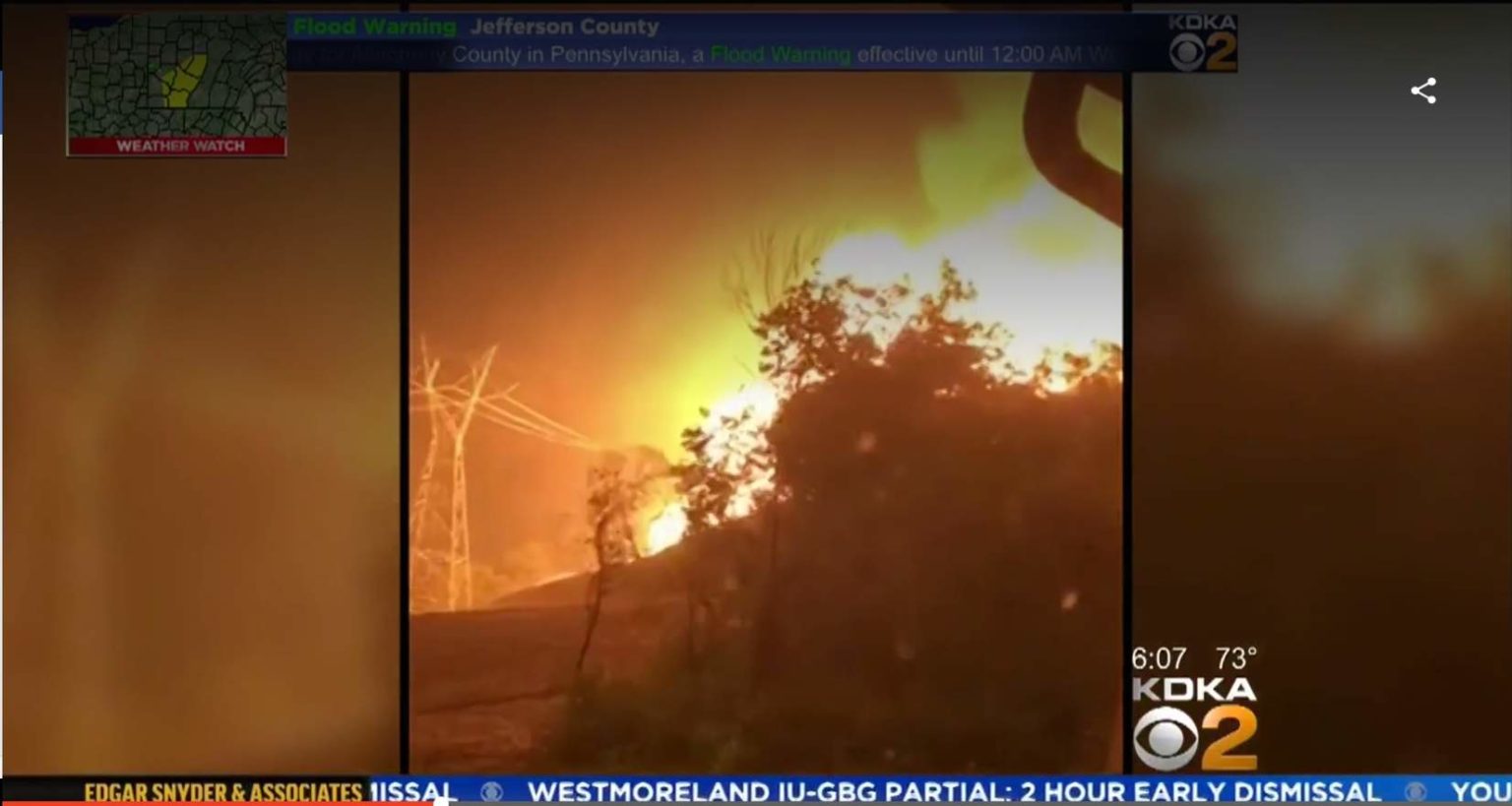Just before dawn Monday morning, Chuck Belczyk thought a jet had crashed near his home roughly 25 miles outside Pittsburgh — until he heard the sound of hissing gas.
“And that’s when it all hit us what was happening,” Belczyk told NPR’s State Impact. “You knew the pipeline went.”
A column of fire shot 150 feet in the air and destroyed a home, a barn, and several cars. Residents of over two dozen homes, including Belczyk, were evacuated, with one family barely escaping the flames that engulfed their home, neighbors said.
Interstate 376 was shut down amid concern over falling power lines, including a half-dozen high tension towers, which left 1,500 people temporarily without electricity. No one was injured or killed by the blast, authorities said, and because of recent rains, the possibility of a forest fire was averted.
The 24-inch diameter pipeline responsible for the blast had gone into service just seven days earlier. It’s owned by Energy Transfer Partners, the same pipeline company behind the Dakota Access pipeline project and the Bayou Bridge pipeline in Louisiana.
The Pennsylvania Public Utility Commission has said it suspects that the blast was caused by heavy rainfall, which they believe may have caused the pipeline to slip on the saturated ground, break, and then explode.
Energy Transfer Partners dubbed its new “gathering” line the Revolution pipeline. Revolution was built to connect individual gas wells to a new cryogenic plant, the Revolution gas processing plant, where so-called “wet gas” from Marcellus wells would be separated into natural gas liquids and dry gas.
From the Revolution plant, that dry natural gas, a fossil fuel made of methane that’s used for electricity and heat, would be shipped west direction on the 725 mile Rover pipeline. Natural gas liquids like ethane, which is used to make plastics and petrochemicals, would head out on the Mariner East 2 pipeline to a shipping terminal near the Atlantic Coast, where it could be shipped to the Gulf Coast or abroad.
By providing a path for the liquids and gas to flow to market, the Revolution gathering line would facilitate the drilling and fracking of roughly 500 Marcellus and Devonian wells in just one Pennsylvania County, Butler County, alone, officials from the company building the cryogenic plant said in 2015, when the deal was announced.
Or at least that was Energy Transfer’s $1.5 billion plan. All three pipelines have been plagued by construction problems, particularly the much larger Mariner East natural gas liquids pipeline project. In the meantime, Energy Transfer Partners has faced strong pressure to finish the project from shale drillers, who aim to sell ethane for a higher price than it commands when it’s left mixed in with methane.
Drillers have publicly warned that more delays finishing the Mariner East system would impact their bottom lines. “If it is delayed to later in the year, that certainly has some costs to it,” Glen C. Warren, CEO of Antero Resources, a drilling company which has leased nearly half a million acres in the Marcellus shale, said during an April 26 earnings call, responding to a question from investors about the impacts of delays to the Mariner East project.
In February, Thomas Long, the CEO of Energy Transfer told investors that while Revolution was “mechanically complete,” the rest of the project was behind schedule. “We’re evaluating other options to move residue and natural gas liquids on Revolution before Rover and ME2 are ready for service,” he said on a Feb. 22 earnings call.
Center Township Police Chief Barry Kramer Kramer told Natural Gas Intelligence, an industry trade publication, that local authorities hadn’t been aware ETP had begun using Revolution to transport any gas or liquids. An ETP spokesperson told the Pittsburgh Post-Gazette that the pipeline was being used as it would be commercially during a “commissioning” or testing phase when the explosion occurred.
Natural gas liquids are expected to play a growing role in the shale industry’s plans for Pennsylvania, Ohio, West Virginia and other parts of the Rust Belt.
A planned new petrochemical corridor in the region has already attracted over tens of billions of dollars in investment, as DeSmog earlier reported – $83 billion of that in West Virginia alone.
“I think the magnitude of some of these projects that we’re talking about here are hard for a lot of us and a lot of our communities to wrap their head around,” Chad Riley, CEO of The Thrasher Group, an oil and gas field and pipeline services firm, said at a petrochemicals conference in Pittsburgh this summer.
Not everyone is convinced that the coming plastics and petrochemicals build-out is a positive thing for the region — or for the rest of the world.
Much of the concern centers on the expansion of plastics manufacturing using fracked gas. “If all of this production capacity is constructed, it may lock in a massive expansion of cheap plastic production for decades,” a report last year by the Center for International Environmental Law found. “With expanded plastics production and consumption will come more spills and emissions from chemical plants, more plastic clogging shorelines and killing marine life, and more micro-plastic particles — and the pollutants they may absorb finding their way into food chains and tap water.”
At a more local level, safety concerns have fueled strong opposition to Energy Transfer’s Mariner East project, driven not only by the company’s troubling track record during construction but also by environmental concerns. Mariner East construction has been repeatedly shut down by the state after mishaps including sinkholes, spills and leaks. State regulators have hit the company with over $13.1 million in fines for violating state environmental and safety laws during Mariner East construction, including a $148,000 fine in August for breaking the state’s Clean Streams Law and the Dam Safety and Encroachment Act.
State Senator Andy Dinneman reacted to the Revolution pipeline blast on Twitter, connecting it to existing concerns over the Mariner East project.
These kinds of pipelines shouldn’t be so close to our schools, residential neighborhoods & community centers. Mariner East should be permanently halted until we get real assurance that they’re being installed, inspected and operated with safety as the top priority. 2/2
— Andy Dinniman (@SenatorDinniman) September 10, 2018
Photo credit: KDKA CBS News video.
Subscribe to our newsletter
Stay up to date with DeSmog news and alerts







